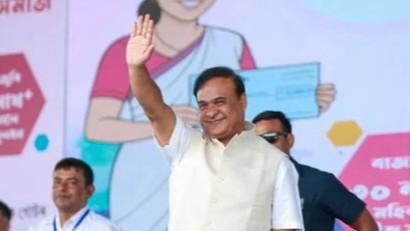
Assam CM helped Nitish work out ₹10,000 for women scheme: Report
In a recent development, it has been reported that the Chief Minister of Assam, Himanta Biswa Sarma, played a significant role in helping the Nitish Kumar government in Bihar devise a scheme to provide ₹10,000 to women. According to sources, a large part of the credit for Bihar’s Mukhyamantri Mahila Rojgar Yojana, which aims to provide financial assistance to women, goes to Sarma. This revelation highlights the collaboration and exchange of ideas between different state governments in India, which can lead to the development of innovative policies and schemes.
As per reports, Sarma sent a team of bureaucrats from Assam to Bihar about five months ago, following a request from the Nitish Kumar government. The team, which consisted of senior officials from the Assam government, made a presentation before the Bihar officials on the ‘Jeevika ₹10,000 model’. This model, which was developed in Assam, aimed to provide financial assistance to women and was later incorporated into the Mukhyamantri Mahila Rojgar Yojana.
The Mukhyamantri Mahila Rojgar Yojana, launched by the Nitish Kumar government, aims to provide ₹10,000 to women in the state, with the objective of empowering them and promoting economic independence. The scheme is expected to benefit a large number of women in Bihar, who can utilize the financial assistance to start their own businesses or pursue other economic activities.
The role of Himanta Biswa Sarma in helping the Nitish Kumar government devise this scheme is significant, as it highlights the importance of collaboration and knowledge-sharing between different state governments. Sarma, who has been at the forefront of implementing various development schemes in Assam, has demonstrated his commitment to empowering women and promoting economic growth.
The ‘Jeevika ₹10,000 model’, which was developed in Assam, has been successful in providing financial assistance to women and promoting economic independence. The model, which was presented to the Bihar officials, provided valuable insights and lessons that were incorporated into the Mukhyamantri Mahila Rojgar Yojana.
The launch of the Mukhyamantri Mahila Rojgar Yojana in Bihar is expected to have a positive impact on the state’s economy and society. The scheme, which aims to empower women and promote economic independence, is in line with the broader objectives of the government to promote inclusive growth and development.
The collaboration between the Assam and Bihar governments on this scheme is also significant, as it highlights the growing trend of cooperation and knowledge-sharing between different state governments. In recent years, there has been an increasing trend of state governments learning from each other’s experiences and best practices, which has led to the development of innovative policies and schemes.
The role of NDA leaders in facilitating this collaboration is also noteworthy. According to reports, NDA leaders played a significant role in bringing the Assam and Bihar governments together, which ultimately led to the development of the Mukhyamantri Mahila Rojgar Yojana.
In conclusion, the report that Assam CM Himanta Biswa Sarma helped the Nitish Kumar government devise the ₹10,000 scheme for women is a significant development. It highlights the importance of collaboration and knowledge-sharing between different state governments, which can lead to the development of innovative policies and schemes. The Mukhyamantri Mahila Rojgar Yojana, which aims to provide financial assistance to women, is expected to have a positive impact on the state’s economy and society.
As the Indian economy continues to grow and develop, it is essential that state governments work together to share knowledge, best practices, and experiences. The collaboration between the Assam and Bihar governments on the Mukhyamantri Mahila Rojgar Yojana is a shining example of this, and it is hoped that other state governments will follow suit.
The news of the Assam CM’s role in helping the Nitish Kumar government devise the ₹10,000 scheme for women has been widely reported, with many praising the initiative. The scheme, which aims to empower women and promote economic independence, is a significant step forward in promoting inclusive growth and development.
As the scheme is implemented and rolled out, it will be interesting to see the impact it has on the state’s economy and society. The success of the scheme will depend on various factors, including the effectiveness of its implementation, the level of participation from women, and the overall economic environment.
In the end, the report that Assam CM Himanta Biswa Sarma helped the Nitish Kumar government devise the ₹10,000 scheme for women is a positive development, which highlights the importance of collaboration and knowledge-sharing between different state governments.






